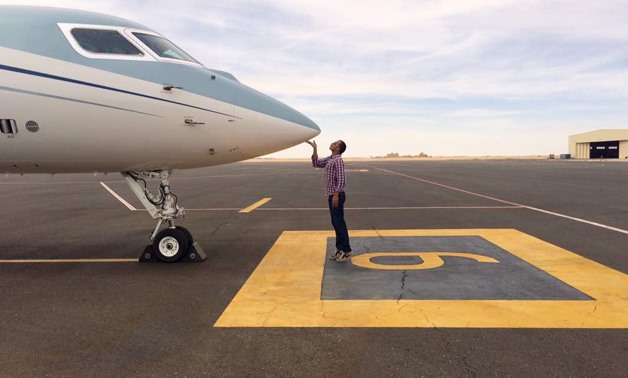
Mohamed Homos by Anna Bersen
From the control tower at Cairo Airport, 26-year-old Muhammad Hommos makes sure that the airplanes land and take off safely. With a busy month like Ramadan when people are travelling more to visit families or celebrate eid, his job becomes especially challenging. “Many people travel to Mecca for umra (small pilgrimage) during Ramadan than the rest of the year. That’s why the Seasonal Terminal was built a little while ago and it only operates flights between Egypt and Saudi Arabia during Ramadan and Hajj,” explains Hommos. “There is a huge increase in flights on that route, which puts even more responsibility on our shoulders. Imagine all Egyptians travelling to and from Saudi Arabia having to go through Cairo Airport!”
Air traffic controllers work shifts all year long, including Ramadan, to ensure the tower is always covered. During Ramadan, however, each shift is divided into two groups. “The first group gives instructions to the pilots and handles air traffic only while the second group is a coordinator for the first group,” explains Hommos. “They are saving airplane data, giving instructions to vehicles on the group and everything moving in the airspace, to mention a few [duties].”
Come Ramadan Hommos makes his way to the airport far earlier than normal to catch the midnight shift because many more people are travelling during Ramadan. “This makes both the airport and the traffic leading up to the airport a lot busier so I usually leave home one hour earlier in case the traffic is bad.”
There’s an increased sense of camaraderie at the airport too, says Hommos. “The atmosphere is very nice and motivational. When we show our ID and go through security, the police officers tell us ‘may God be with you and give you strength and power to focus on your hard work.’ The atmosphere is completely different because in the beginning or end of every call you’ll hear ‘Ramadan Kareem!’ Those two small words always make me feel good,” Hommos says. “It gives me energy and really motivates me.”
At sohour Hommos takes turns with his partner to go eat. “Rule number one in the air traffic control room is no food or drinks in front of us, because we have to be careful around all the instruments. So for sohour and iftar I take a 30-minute break, where I leave the responsibilities to my partner to go and eat. When I come back, my colleague leaves to eat and I take the responsibility alone.”
Once sohour has ended and the fast begins, Hommos says the work gets more stressful. “Work is more stressful and tiring than the rest of the year. It’s harder to focus and concentrate without food or water but I keep focused because I have a workmate as a coordinator. He keeps me alert if I lose focus, and shares the responsibility with me.
When it’s not Ramadan I work alone and take full responsibility and only get help if I need to use the bathroom or feel sick. We have two bosses always watching everyone work, so if anything goes wrong they can take the microphone and let us rest for a little bit.”
 Mohamed Homos by Anna Bersen
Mohamed Homos by Anna Bersen

Comments
Leave a Comment